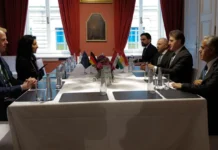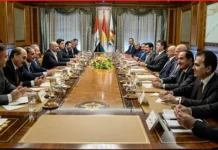Iraq Maintains Global Ranking In Gold Reserves
Iraq Amr Salem September 2, 2025 268 A gold vault holding gold bars. Photo: Shutterstock
Baghdad (IraqiNews.com) – The World Gold Council announced on Tuesday that Iraq’s gold reserves had remained stable. According to the most recent assessments released by the council, Iraq
has made no gold purchases since the beginning of 2025. The council highlighted that it remained in 29th place internationally out of 100 with the highest gold reserves.
Iraq’s gold holdings amounted to 162.7 tons, or 16.9 percent of its total foreign reserves.
Additionally, following Saudi Arabia, Lebanon, and Algeria, Iraq kept its fourth rank among Arab countries. In response to growing economic and geopolitical threats, central banks worldwide are increasing their holdings of bullion.
The country’s gold reserves increased by 45.1 percent in the fourth quarter of 2024 compared to the same period in 2023, according to data released earlier in March by the Central Bank of Iraq (CBI).
The World Gold Council, which has offices in India, China, Singapore, the United Arab Emirates, and the United States in addition to its headquarters in London, seeks to leverage market expansion to sustain and raise demand for gold.
Iraq’s gold holdings reflect the country’s ongoing efforts to diversify its foreign reserves and improve long-term financial and monetary stability.
Gold has historically been a shelter for investors, particularly during uncertain geopolitical and economic times. https://www.iraqinews.com/iraq/iraq-maintains-global-ranking-in-gold-reserves/
Iraq’s Trade Ministry Reviews Reforms In Private Banking Sector
Iraq Amr Salem September 2, 2025 The Central Bank of Iraq. Photo: INA Baghdad (IraqiNews.com) – The Iraqi Ministry of Trade discussed on Monday reforms in the private banking sector, addressing the condition of the important sector and possibilities for solutions.
During a meeting held by the Trade Ministry’s Center for Commercial and Economic Studies, the
discussions included the Central Bank of Iraq’s (CBI) flexibility with private banks, as well as approaches to monitor the impact of future changes, according to Shafaq News.
Suggestions will be provided to the prime minister, including maintaining CBI flexibility toward private banks based on their capacity, easing limits on sanctioned banks, and ensuring their involvement in financial activities.
Iraq’s financial system remains severely strained, with almost half of its institutions under international sanctions, a hurdle that analysts say might transform reforms into a cause for breakdown rather than progress.
Previously, the CBI reached a deal with the consulting company Oliver Wyman
to perform assessments as part of its restructuring strategy.
In mid-August, officials from the CBI met with representatives from Oliver Wyman
to discuss a banking reform proposal offered by the Iraqi Private Banks League (IPBL) to modernize Iraq’s banking industry and align operations with worldwide practices.
The strategy intends to stabilize the banking sector so that it can function securely and effectively in accordance with international norms and standards, as well as local legislation, while also strengthening governance, compliance, and risk management.
The strategy also allows banks to perform an economic role that promotes growth while providing the most effective services possible. https://www.iraqinews.com/iraq/iraqs-trade-ministry-reviews-reforms-in-private-banking-sector/
Iraq’s Domestic Public Debt Rises Sharply
Iraq domestic debt to rise breaking Energy and Business
2025-09-02 Shafaq News – Baghdad The Central Bank of Iraq announced on Tuesday that domestic public debt will rise by the end of June 2025.
The bank said in an official statistic seen by Shafaq News Agency, “Iraq’s domestic public debt rose by the end of June of this year to reach 87 trillion and 748 billion Iraqi dinars, an
increase of 2.56% compared to May, which reached 85 trillion and 503 billion dinars, also an
increase of 5.35% compared to 2024, which reached 83.050 trillion dinars, and an
increase of 19.59% compared to 2023, which reached 70.558 trillion dinars.”
He added, “The increase was a result of the increase in the payment of farmers’ dues, which reached $14.83 trillion, up from $12.568 trillion.”
The bank pointed out in its statistics that the remaining debts are owed by the Ministry of Finance amounting to 756 billion dinars, and treasury transfer debts at the Central Bank and commercial banks amounting to 51 trillion and 30 billion dinars, in addition to treasury transfers on the account of the Ministry of Finance amounting to 2 trillion and 30 billion dinars, and loans to financial institutions amounting to 19 trillion and 102 million dinars.
https://shafaq.com/ar/اقتصـاد/ارتفاع-كبير-بالدين-العام-الداخلي-للعراق
Government Advisor: Iraq Has Achieved Remarkable Success In Recovering Funds From Abroad.
Baghdad – INA – Nassar Al-Hajj The Prime Minister‘s financial advisor, Mazhar Mohammed Salih,outlined two paths for recovering Iraq‘s assets on Tuesday, including corruption funds from after 2003 and funds from the former regime. He emphasized that Iraq has achieved remarkable success in this area.
Saleh told the Iraqi News Agency (INA):
“Based on the Iraqi Asset Recovery Fund Law No. (9) of 2012, which was amended by Law No. (7) of 2019, the objectives of the amendment were determined to expand the powers of the fund’s management to enable it to recover smuggled funds as a result of corruption after 2003, in addition to encouraging those cooperating with the fund by granting rewards to informants on smuggled funds, with an emphasis on strengthening international coordination by proposing agreements with countries and regional and international organizations in this regard and conducting mutual judicial assistance.”
He added, “An agreement for economic and technical cooperation between Iraq and relevant countries and nstitutions provides for a lever for cooperation in tracking and recovering our country’s funds that have been smuggled abroad by various means, as well as enabling the fund to file lawsuits inside and outside Iraq against individuals involved in corruption and the smuggling of the country’s funds.”
He pointed out that “the fund is linked to the Council of Ministers and enjoys legal personality.
It consists of a board of directors headed by the Chairman of the Integrity Commission, the Director General of the Recovery Department at the Integrity Commission, and representatives from the Ministries of Foreign Affairs, Oil, Finance, Justice, and Trade, the Central Bank of Iraq, the Federal Board of Supreme Audit, relevant security agencies, and the Supreme National Commission for Accountability and Justice.” He pointed out that
“there are extensive procedural mechanisms in place, such as opening closed accounts inside and outside Iraq in the name of the Ministry of Finance to deposit revenues from recovered funds, the possibility of distributing recovered funds in four installments over a period not exceeding six months, and the use of experts from inside and outside Iraq and determining their remuneration.”
Saleh explained that “there are two types of funds that are being pursued, confiscated, and legally tracked within the areas of international jurisdiction in two tracks, the first of which is the funds of the former regime: they have been dealt with since 2003 based on Security Council resolutions, especially Resolution 1483, and governmental/diplomatic channels with countries that have frozen assets.
Parts were transferred to the Development Fund for Iraq in 2003-2004, and diplomatic pressure was later completed. This track is based primarily on countries’ commitments to UN resolutions.”
He added, “The second type is corruption funds after 2003.
The main framework for this process is the United Nations Convention against Corruption (UNCAC), which Iraq ratified under Law No. 35 of 2007, with the work of the Integrity Commission and the Recovery Fund, and through memoranda of understanding and technical assistance (within initiatives such as StAR and bilateral partnerships that the Integrity Commission is working on diligently and effectively with the national and international judicial climates).”
Saleh emphasized that “the inventory of Iraq’s rights is ongoing and is announced from time to time, and represents a remarkable success for the Asset Recovery Commission,” noting that
“there are many obstacles, including: the diversity of evidence systems and the criminalization of illicit enrichment, the complexities of bank secrecy and tax havens, as well as the slow pace of mutual legal assistance and cross-border procedures, and loopholes in tracking hidden money and identifying the real beneficiary, in addition to precedents of settlements that return part of the money in exchange for reduced penalties, and the accompanying controversy over deterrence, without neglecting the diversity of evidence systems, the complexities of bank secrecy and tax havens, and the limited statistics and unified rules for documenting the results.”
He pointed out that “it is not an easy legal and technical process, both local and international, especially the inventory of Iraqi properties and real estate abroad, including various buildings, which requires inventorying and monitoring them in direct and indirect cooperation with oversight agencies, including the Asset Recovery Fund.” https://ina.iq/ar/economie/242436-.html
For current and reliable Iraqi news please visit: https://www.bondladyscorner.com/






